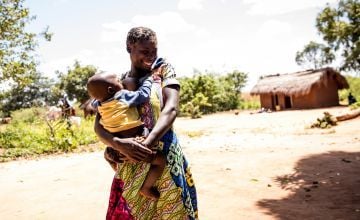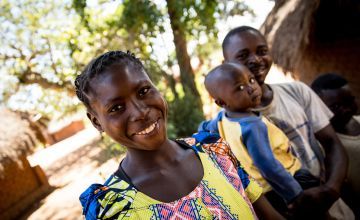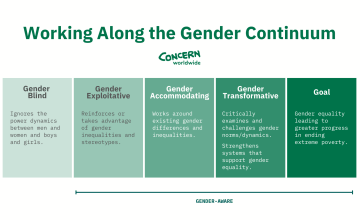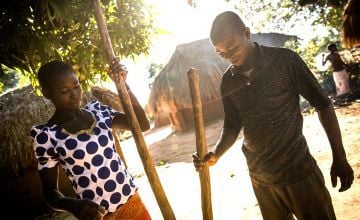
Read our 2023 annual report

Knowledge Hub
Concern Worldwide has been working in the Democratic Republic of Congo since 1994, offering both humanitarian assistance and long-term development in response to the DRC's ongoing crisis. One of the biggest challenges here is gender inequality. Gender equality is an important step in breaking the cycle of poverty, which means that we’re especially committed to bringing a gender-transformative approach to all of our work in the DRC, from emergency response to water and sanitation to helping families develop sustainable livelihoods
Gender equality in DRC: By the numbers
- The DRC ranks 150 out of 162 countries on the UNDP 2020 Gender Inequality Index
- 473 out of 100,000 Congolese women are expected to die due to complications from pregnancy or childbirth
- For every 1,000 girls in the DRC, 124 will become mothers between ages 15 and 19
- Women hold 12% of seats in Congolese Parliament
- Men are almost twice as likely as women to go beyond primary education in the DRC; 65.8% of men have at least some secondary education, versus just 36.7% of women
- 51% of women in the DRC will experience violence from an intimate partner in their lifetime; 37% have reported so in the last 12 months
- 37% of women in the DRC were married before their 18th birthday

A tradition made to be broken
As in many of the countries where we work, traditional gender disparities persist in the Democratic Republic of Congo, across all sectors. The result of traditional patriarchal structures, these inequities are linked to lower education levels in women, lack of work experience, and inequitable attitudes and practices that limit women’s exposure to the labour market.
The country's Family Code supports this, with wives having limited autonomy in their marriages and being legally obligated to obey their husbands. This leads to high rates of gender-based violence and domestic abuse and — even worse — a prevailing acceptance of these behaviours, both for men and women.
Even in peaceful homes women are frequently left out of the decision-making process for their families, have little to no financial independence, and bear the brunt of burden for physical work.

‘Everything was about me making firm decisions’
Until recently, Natalie Ngoyi was one of those women. A 20-year-old wife and mother, Natalie and her husband George were a typical couple in Manono Territory. Natalie cut firewood, fetched water, worked in the fields digging cassava, cleaned, prepared meals, and tended to her 1-year-old as well as the three children from the couple’s extended family who live with them. Despite playing such an active role in her family, however, her opinions usually went unheard.
‘I rejected all of Natalie’s proposals as she is a woman,’ George explained to Concern. ‘Everything I did before the training was about me making firm decisions.’
This is the measure of being a man in the traditional Congolese culture in which both George and Natalie grew up. However, some traditions are made to be broken.
Examine, challenge, and strengthen
George and Natalie participated in Concern’s Graduation programme in the DRC, which began in 2017 with funding from Irish Aid. A model with a proven track record, Graduation helps families ‘graduate’ out of cyclical poverty by supporting them with training, cash grants, and loans to start and maintain their own businesses. A provision of this programme, however, was that George needed to attend gender equality sessions, supporting one of the programme’s main goals of increasing the participation of women at both the household and community levels of decision-making.
These trainings offer a comprehensive approach to gender equality, violence against women and girls, and gender transformation. More than working around existing gender differences and inequalities, gender transformative work critically examines and challenges gender norms and traditional dynamics, and strengthens the systems that support equality between the sexes.

Quantitative research shows that these trainings, which include separate sessions for men and women as well as couples’ sessions that bring partners together, lead to results. After the first year of Graduation work in the DRC, overall results showed that nearly 39% of community members surveyed said that women were consulted in decisions made at home, exceeding the target set that year for 27%. This is good on its own, but for families participating in Graduation, that number went up to over 63%.
Planting the seeds for a stronger future
These sessions are part of a comprehensive gender equality focus Concern is currently implementing in the DRC, but one that lays important groundwork for the future. George is an example of how much a shift in attitudes, with support from other men in his community who have also attended the same training, can have a ripple effect. He is now committed to taking an active and equal role in the household.

‘I work in the fields, I dig the cassava too. I cut firewood and prepare cassava leaves for food. I draw water in the house and get the fire going in the kitchen,’ he says, listing off the home’s new division of labour. But beyond this is an even more important shift: ‘I now consider my wife to be my equal.’
Other ways to help
Corporate support
Is your company interested in working together for a common cause?
Fundraise for Concern
From mountain trekking to marathon running, cake sales to table quizzes, there are lots of ways you can support our work.
Buy a gift
With an extensive range of alternative gifts, we have something to suit everybody.
Leave a gift in your will
Leave the world a better place with a life-changing legacy.
Volunteer with Concern
The lots of ways to get involved with our work as a volunteer
School fundraising
Without the generous support from schools, we wouldn't be able to do the work that we do.

